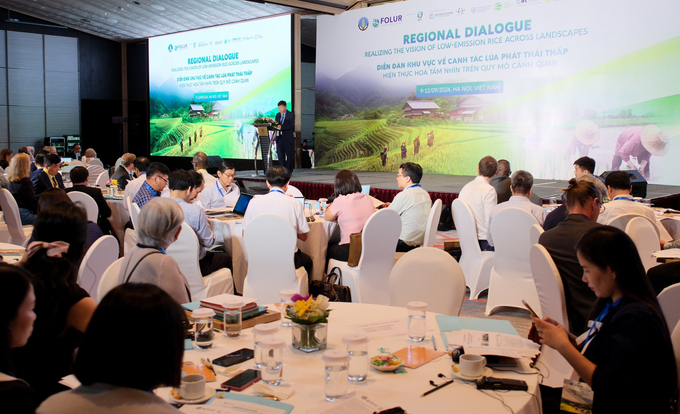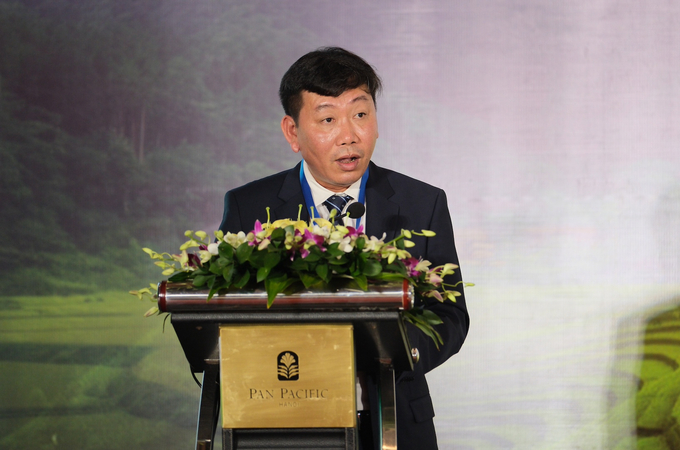June 19, 2025 | 22:41 GMT +7
June 19, 2025 | 22:41 GMT +7
Hotline: 0913.378.918
June 19, 2025 | 22:41 GMT +7
Hotline: 0913.378.918
Dr. Nguyen Do Anh Tuan - Director General of MARD’s International Cooperation Department, delivered the opening remarks to the forum. Vietnam Agriculture News respectfully introduces Dr. Tuan’s speech at the conference.
Despite achievements in poverty reduction and sustainable development, the world still faces numerous challenges like unexpected climate change, scarce and depleting natural resources, pandemics and geo-political conflicts.
As reported by the Food and Agriculture Organization (FAO), about 828 million people are suffering from hunger, accounting for 10% of the world’s population, and more than 80% of extremely poor people are living in rural areas. It is expected that the Asia-Pacific region will possibly achieve SDGs only by 2062, or three decades behind the schedule.
Rice is a key staple crop, providing 20% of the world’s calories, and playing an important role in national food security. The rice sector is also an important source of employment for the poor in rural areas. Smallholders are producing 80% of the world’s rice, and 144 million people worldwide are rice farmers. This does not include the hundreds of millions of people who directly or indirectly live on the rice value chain.

Dr. Nguyen Do Anh Tuan - Director General of MARD’s International Cooperation Department, addressed the forum. Photo: Quynh Chi.
Rice production is a traditionally important industry in Vietnam, creating livelihoods for tens of millions of farmers nationwide. Viet Nam has obtained remarkable achievements in rice production, making a significant contribution to national food security and position as one of the leading rice exporters in the world, with increasing export value. Vietnamese rice has reached markets in all corners of the world, from Asia, Europe, America to Africa, with an annual export volume of more than 6 million tonnes. The rice production this year is estimated at 43.4 million tonnes of paddy, ensuring national food security and enabling export of 7.6 million tonnes of rice, worth more than USD 5 billion.
The Government of Vietnam has paid special attention to sustainable development as well as adaptation to climate change, and implemented actively and responsibly its international commitments. At COP26, the Prime Minister committed that Vietnam would reach net zero emissions by 2025, join “the Global Methane Initiative”, implement “Glasgow Leaders' Declaration on Forests and Land Use” and some other initiatives.
At COP28, Vietnam joined the Emirates Declaration on Resilient Food Systems, Sustainable Agriculture, and Climate Action. Its participation in international commitments and initiatives has greatly changed the approach to agricultural production in general and rice production in particular toward more transparency, responsibility and sustainability.
Vietnam’s agriculture is not only affected by climate change but emitting a considerable amount of greenhouse gas (GHG). According to MONRE’s GHG inventory, agriculture and forestry release the third highest rate of net emission with 13.9%. However, methane emission of agriculture accounts for 62% of the national methane emission, and 75% of emission from agriculture comes from production of water rice – a key crop of Viet Nam’s agriculture.
In the context of market fluctuations of the world, changes in consumers’ tastes and impacts of climate change, Viet Nam’s rice sector is experiencing a significant transformation in both production and export. Thereby, the sector is focusing on higher quality and sustainable production.

According to Dr. Tuan, Vietnam has paid special attention to sustainable development as well as adaptation to climate change. Photo: Quynh Chi.
With the target of 1 million ha of high quality and low emission rice production area in close combination with restructured production system along the value chain, applied sustainable farming procedures, enhanced production and business effectiveness, improved income and living standards of rice growers, adaptation to climate change and reduction of GHG emission, the Vietnamese Prime Minister approved the “Sustainable Development Project for 1 Million Hectares of Specialized, Low-Emission High-Quality Rice Farming by 2030”.
MARD has worked with the International Rice Reseach Institute (IRRI) and some relevant provinces and stakeholders to wrap up and assess 7 models in 5 provinces in the Mekong River Delta which are piloting in this project to evaluate their feasibility and potential for scaling up. These models focus on promoting the synchronous application of technical solutions and technologies to reduce emissions.
The models also implement mechanization and support farmers and cooperatives to establish linkage with businesses along the value chain, aiming at cost reduction, income increase for farmers and effective straw treatment.
To implement the project successfully, Vietnam needs to make great efforts, not only from the Government’s agencies but also the private sector, the businesses and producers directly involved in the project implementation at different levels to mobilize resources from the whole society. Financial approach is a key element that helps farmers and businesses in the rice value chain invest in new technologies, improve production procedures and enhance economic effectiveness.
However, in fact, businesses, especially medium and small size ones and farmers, are struggling with a lot of difficulties in accessing finance for their investment in agriculture. In addition, the trend to use low-carbon and environmental-friendly products is creating market advantages and raising export values for the goods which have low emission certification.
Therefore, the investment toward environmental friendliness, low emission and sustainability is an evitable trend for many sectors, including the rice sector.

Removing rice straw from fields is one of the effective measures to reduce GHG emissions. Photo: Kim Anh.
The regional forum ‘Realizing the Vision of Low-Emissions Rice Across Landscapes” is expected to be an opportunity for us to discuss, share experiences and coordinate policies to enhance access to finance science and technology organize production, processing, distribution, trading toward low emission and sustainability for stakeholders in the rice value chain in particular and food systems. Furthermore, participants can learn about the demands and ways to shape the carbon credit market which is still new and challenging for the rice sector.
Vietnam is willing to cooperate and share with other countries in agriculture in general and rice sector in particular through South-South cooperation program, with other countries in Asia, Africa, Latin America and the Caribbean. In the cooperation programs, Vietnam shares and transfers its knowledge, by sending its experts for training and technology transfer, not only on the rice sector but also others like rubber, coffee, cashew nuts, vegetables, fruits, aquaculture, etc.
On this occasion, the MARD thanks the World Bank, GEF, FAO, IRRI, the international community, donors, research institutes, NGOs, businesses, provinces, and scientists who support Vietnam in developing the agriculture and rural areas in general and the rice sector in particular for many years. The MARD looks forward to receiving further assistance to implement the 1 million ha of high-quality and low-emission rice project.
![Turning wind and rain into action: [9] Digitizing hydrometeorological data in response to climate change](https://t.ex-cdn.com/nongnghiepmoitruong.vn/608w/files/news/2025/06/17/z6704423696987_15fd32ffc26d590d204d520c9dac6786-nongnghiep-165943.jpg)
(VAN) Farmers have begun accessing hydrometeorological applications to adjust their cropping schedules, aiming to ensure productivity and adapt to climate change.
![Turning wind and rain into action: [8] Real-time salinity detection and early warning technology](https://t.ex-cdn.com/nongnghiepmoitruong.vn/608w/files/news/2025/06/17/z6704423696987_15fd32ffc26d590d204d520c9dac6786-nongnghiep-151127.jpg)
(VAN) Thanks to the integration of modern hydrological-hydraulic models, remote sensing technologies, and artificial intelligence, the accuracy of hydrological forecasting has significantly improved.
![Turning wind and rain into action: [7] Early disaster warnings help marine farmers minimize losses](https://t.ex-cdn.com/nongnghiepmoitruong.vn/608w/files/news/2025/06/17/z6704423696987_15fd32ffc26d590d204d520c9dac6786-nongnghiep-142942.jpg)
(VAN) In recent years, thanks to early disaster warnings and forecasting, marine farmers in Khanh Hoa province have been able to reduce risks and losses, thereby improving production efficiency.
![Turning wind and rain into action: [6] ‘Four on-the-spot’ disaster management software](https://t.ex-cdn.com/nongnghiepmoitruong.vn/608w/files/news/2025/06/17/e5a48259d6a262fc3bb3-nongnghiep-183800.jpg)
(VAN) By simply activating the scenario on the disaster management software, the relevant authorities immediately know how many households need to be evacuated, where to evacuate them to, and by what means of transportation…
![Turning wind and rain into action: [5] Hue applies modern technology in disaster forecasting](https://t.ex-cdn.com/nongnghiepmoitruong.vn/608w/files/news/2025/06/17/z6704423696987_15fd32ffc26d590d204d520c9dac6786-nongnghiep-093938.jpg)
(VAN) In Hue city, modern technology has recently been applied in meteorological and hydrological forecasting and warning, helping to reduce the damage caused by natural disasters.

(VAN) A cutting-edge farming technique being implemented on an experimental ranch in Arizona's Sonoran Desert has already saved a billion gallons of water over five years, according to Civil Eats.

(VAN) Poultry and pig production and the environment can be boosted through enhanced water technology, according to new research.